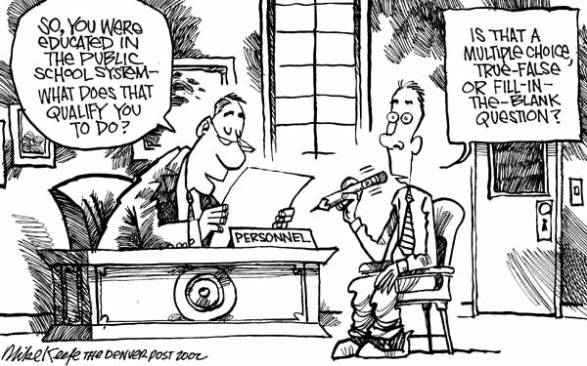Michelle Rhee, founder and chief executive of StudentsFirst and chancellor of D.C. Public Schools from 2007 to 2010, is somewhat of an ironic woman given she works for an organization meant to put students first but she fails to do so.
In her article Opting Out of Standardized Tests? Wrong Answer she highlights some of the reasons why she believes standardized testing is a good thing. She attempts to explain why giving parents the option to opt their children out of test would be detrimental rather than helpful. Her views are very much in tune with what is best for a society’s progression rather than what is best for the student and here is where her argument beings to fall apart.
Putting students first means meeting their needs above all else. From her perspective, standardized tests are a form of measurement that help “prepare” students to compete with other countries in various subjects like math. As she states, “the children sitting in classrooms today are going to grow up and compete for jobs with people in India and China and Europe, not just with people in the state next door.” Rhee then makes education about competition rather than learning. Students are taught to be the best out of everyone else rather than be the best that they can be. They want to outdo those around them rather than work with those around them, they’re made to think about failure and success on a scale instead of actually learning the material they’re given and internalizing it.
She also argues that in order to make sure students get good scores on standardized tests the teachers must be “excellent.” That is to say, if a child’s scores do not meet the requirement, it’s the fault of the teacher for not teaching them “correctly.” She states, “This conversation about standardized testing should focus on how we [can] make sure every student… [has] an excellent teacher….Instead, critics dumb down the discussion by focusing on the time spent filling in bubbles on test sheets.” How can we make sure every student, in every classroom has an “excellent” teacher? How exactly does Rhee define “excellence?” Is it by the students test scores, is it by the admiration and respect of that teacher’s students, is it by a teacher evaluation? What exactly makes this “excellent” teacher that is suppose to miraculously figure out the perfect formula for teaching students material on the test in the hopes that they will one day become competitors with other countries? Note, competitors, not allies; Rhee is essentially promoting division among cultures based on education. Education should not be used for competition, it should be used to foster understanding between people. The United States education system’s intention is to give Americans the best education possible; they utilize standardized tests to do so, but is competition really the way to go? Better question, are standardized tests just a dressed up way of figuring out who’s leading in education, are they just yet another tool of competition and at our children’s expense?
Rhee later addresses the fact that these tests are stressful to students; she states, “life can be stressful; life can be challenging.” She does not address the fact that children have young, developing minds. She chalks up their stress to a part of life everyone must go through, she ignores the fact that children are not adults and handle stress very differently. Frankly, if she’s acknowledging the stress students go through, then everything else she tries to justify that stress falls flat. School is not meant to be a place of stress for young students, it is meant to be a safe environment for children to find their passions, to learn about the world, and to discover who they are as people.
(Word Count: 605)


